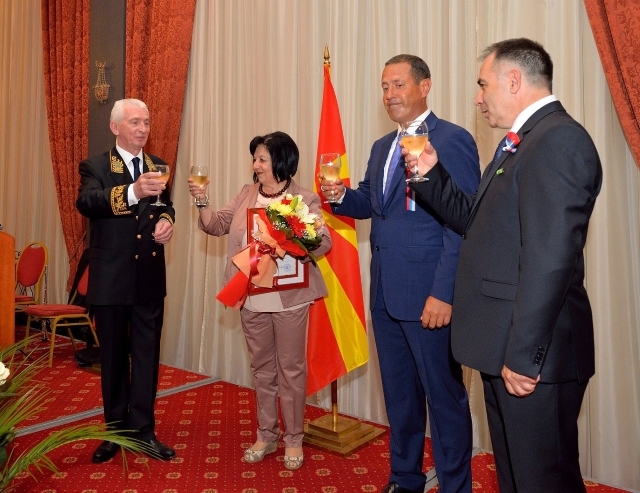‘Neutralizing’ Operation
Full version available on the ‘Novaya Gazeta’ website
Macedonian counter-intelligence documents prove that Russian intelligence services are trying to block the country’s accession into NATO and form a belt of neutral countries in the Balkans.
An anonymous source in the Macedonian government handed over an archive of dozens of secret reports to journalists from the International Organized Crime and Corruption Reporting Project (OCCRP). The Macedonian TV channel NOVA and the Serbian media outlet KRIK were also involved in the joint investigation.
The documents have been compiled based on wiretapping of phone conversations, outdoor surveillance and shared stories from certain sources.
As is pointed out in the documents, Russian SVR (External Intelligence Service) and GRU (Main Intelligence Directorate) officers, along with Russian embassy staff, tried to influence the domestic policy of Macedonia and other Balkan states, so as to prevent their accession into NATO and promote Russia’s interests. The ‘Novaya Gazeta’ (New Newspaper) tells about the OCCRP’s investigation.
‘Destructive propaganda’
According to the Macedonian counter-intelligence reports, Russia has recently strengthened its influence in the Balkans, in particular Macedonia.
Russia has intensified its intelligence activity after several Balkan countries voiced their intention to join NATO. The Montenegro Parliament voted for joining the Alliance in April this year, while Macedonia, as well as Bosnia and Herzegovina, were granted candidate status for NATO membership.
“The Russian Federation applies so-called ‘soft power’ methods, which is part of its strategy aimed at isolating the Balkans from Western influence.” “In addition, Russian foreign policy is tightly linked to an energy strategy, which is aimed at gaining control over the country’s strategic energy resources,” read the reports.
The Macedonian counter-intelligence officials believe that the ultimate goal of this plan is ‘to make Macedonia fully dependent on Russian policy’.
SVR and GRU agents
For many years, Russian agents have been engaged in recruiting former and incumbent officers from the Macedonian army and police forces, so as to ‘form a critical mass of people with military training and use them for Russia’s interests at the right political moment’, read the reports.
In addition, Russian officials tried to influence the editorial policy and offered money to the Macedonian media outlets in order to promote Russian policy in the country.
“Russia is pushing the idea of a pan-Slavic identity and a common Orthodox faith,” read the documents. About 30 ‘friendship associations’ have recently been set up in Macedonia by the initiative of the Russian Embassy. Also, the Embassy is sponsoring the construction of Orthodox churches across the country.

Russia-West confrontation
According to the Macedonian counter-intelligence officials, the Russia-Serbia joint actions led to a complex political crisis in Macedonia – a confrontation between key political parties, that resulted in disturbances in the country’s parliament. This political crisis is further aggravated by ethnic disagreement with the Albanian minority group: Albanians make a quarter of Macedonia’s population, and their previous attempts to declare autonomy nearly ended in a civil war.
Snap elections were held in the country in December 2016. They were supposed to put an end to the political crisis. However, that didn’t happen. The coalition government was approved by the parliament only last week, on 31 May. Zoran Zaev, leader of the opposition Social Democratic Union of Macedonia (SDUM), became the country’s prime minister.
All previous attempts to form a coalition resulted in an assault on parliament by ; Zaev and dozens of other people were injured as a result of disturbances on 27 April.
The Russian leadership blamed the USA and the EU member-states for orchestrating a change of power in Macedonia and for supporting Zaev.
One of the counter-intelligence reports retells a conversation between the RF Ambassador, Oleg Scherbak, and a Macedonian Foreign Ministry official, dated 7 April 2017.
Relying on the document, the RF Ambassador admitted to his foreign counterpart, that Russia sought ‘to form a belt of neutral states in the Balkans, comprising Montenegro, Bosnia and Herzegovina, Macedonia and Serbia.’
Scherbak allegedly complained about insufficient support for Russian policy in the country and for Russian statements about foreign countries’ ‘meddling’ in the internal political processes in the country.
Scherbak assumed that if the Macedonian authorities didn’t publicly support the Kremlin, this would lead to curtailing the economic and diplomatic cooperation.
Russian diplomats refused to answer the OCCRP’s questions.

Assistance to Serbia
The secret documents’ archive also includes wiretapping of conversations of some of the Serbian BIA intelligence service officers. As is pointed out in the reports, the Serbian intelligence officers helped their Russian counterparts carry out their plans in Macedonia.
The BIA officer, Goran Zivaljević, who was actively working to prevent Macedonia’s integration into Europe, has been under counter-intelligence surveillance since 2013. As is pointed out in the documents, Zivaljević gave instructions to Ivan Stoilković, a pro-Russian member of the Macedonian Parliament and a leader of the Serb Democratic Party.
Stoilković also met on a number of occasions with politicians from neighboring Montenegro, who opposed their country’s accession to NATO. Among those politicians there were individuals whom the Macedonian counter-intelligence agents referred to as Russian intelligence service agents.
The secret documents also prove that Stoilković coordinated with a BIA officer reagrding some critical publications about Zoran Zaev in Serbia. Indeed, the Serbian media outlets actively criticized Zaev, stressing that the West’s interference, as well as the Albanians’ political demands, could trigger a war.
The OCCRP journalists got through to Stoilković on the phone.
“When you meet someone, do I ask you about it? Shame on you. You are insulting me,” he told the journalists.
Goran Zivaljević, the Serbian intelligence service officer, refused to answer the journalists’ question. The Russian authorities and intelligence services haven’t so far commented on the aforesaid either.


















